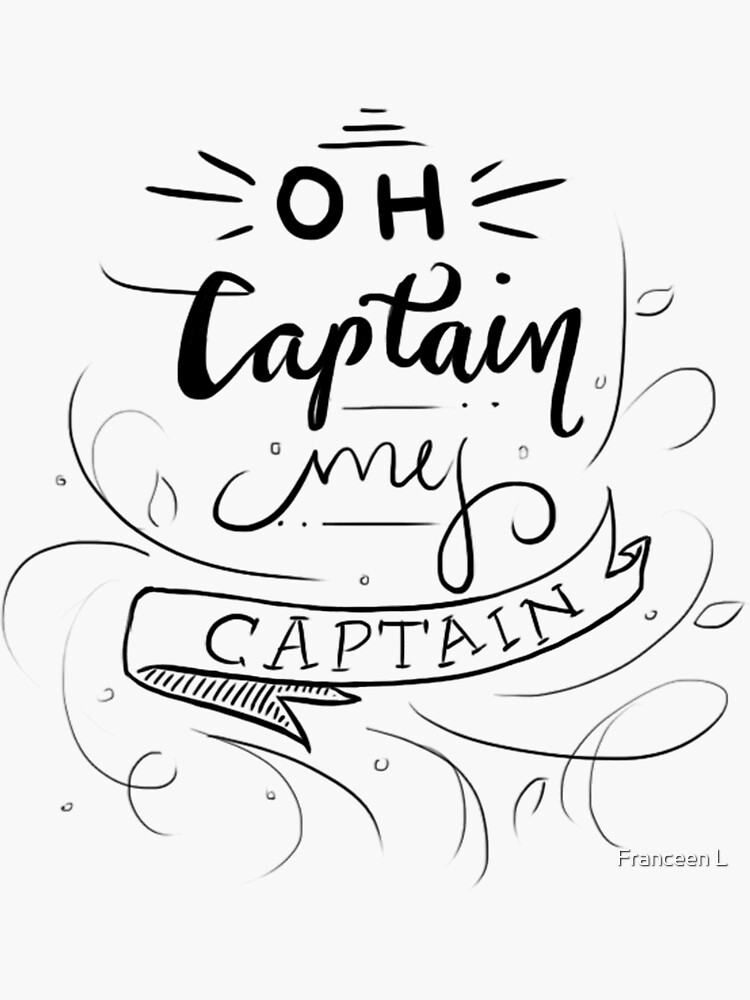

While visiting Brooklyn, Whitman contracted to have his collection of Civil War poems, Drum-Taps, published. On February 24, 1865, George was granted a furlough to return home because of his poor health, and Whitman travelled to his mother's home in New York to visit his brother. Whitman's brother, Union Army soldier George Washington Whitman, was taken prisoner in Virginia in September 1864, and held for five months in Libby Prison, a Confederate prisoner-of-war camp near Richmond. Whitman's poetry was informed by his wartime experience, maturing into reflections on death and youth, the brutality of war, and patriotism. He volunteered in the army hospitals as a nurse.

O captin my captiain series#
Īt the start of the American Civil War, Whitman moved from New York to Washington, D.C., where he held a series of government jobs-first with the Army Paymaster's Office and later with the Bureau of Indian Affairs. Whitman's work received significant attention following praise for Leaves of Grass by American transcendentalist lecturer and essayist Ralph Waldo Emerson. The brief volume, first released in 1855, was considered controversial by some, with critics particularly objecting to Whitman's blunt depictions of sexuality and the poem's "homoerotic overtones".
O captin my captiain free#
Whitman intended to write a distinctly American epic and developed a free verse style inspired by the cadences of the King James Bible. Walt Whitman established his reputation as a poet in the late 1850s to early 1860s with the 1855 release of Leaves of Grass. It is famously featured in Dead Poets Society (1989) and is frequently associated with the star of that film, Robin Williams. The poem has made several appearances in popular culture as it never mentions Lincoln, it has been invoked upon the death of several other heads of state. Critical opinion has shifted since the mid-20th century, with some scholars deriding it as conventional and unoriginal. These elements likely contributed to the poem's initial positive reception and popularity, with many celebrating it as one of the greatest American works of poetry. Stylistically, the poem is uncharacteristic of Whitman's poetry because of its rhyming, song-like flow, and simple " ship of state" metaphor. He later included it in the collection Leaves of Grass and recited the poem at several lectures on Lincoln's death.

"My Captain" was first published in The Saturday Press on November 4, 1865, and appeared in Sequel to Drum-Taps later that year. Although he never met Lincoln, Whitman felt a connection to him and was greatly moved by Lincoln's assassination. Together with " When Lilacs Last in the Dooryard Bloom'd", " Hush'd Be the Camps To-day", and " This Dust was Once the Man", it is one of four poems written by Whitman about the death of Lincoln.ĭuring the American Civil War, Whitman moved to Washington, D.C., where he worked for the government and volunteered at hospitals. Well received upon publication, the poem was Whitman's first to be anthologized and the most popular during his lifetime. " O Captain! My Captain!" is an extended metaphor poem written by Walt Whitman in 1865 about the death of U.S. Printed copy of "O Captain! My Captain!" with revision notes by Whitman, 1888


 0 kommentar(er)
0 kommentar(er)
